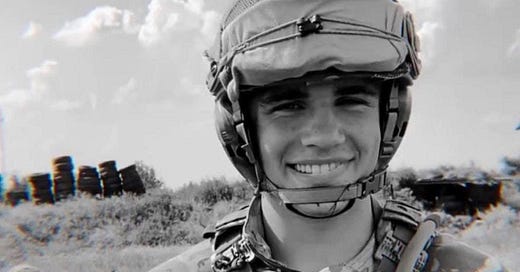The significance of Mariupol and the death of a 20-year-old soldier
President Zelenskyy allowed the soldiers in Mariupol to decide whether to stay about a week ago. They refused to "abandon" the wounded and dead.
Yaroslav Brihynets (call sign "Makhach”) was attempting to help a friend under fire when the Russians killed him. The life of 20-year-old Yaroslav is one of many lives lost depriving the Russians of a prize they so desperately want: Mariupol.
WHY YAROSLAV WAS IN MARIUPOL
The Russians gave Mariupol an ultimatum two weeks ago--surrender or face tribunals and possible death. Ukraine refused, likely in part, because of Mariupol's strategic importance. Taking Mariupol would help Russia claim other cities and bridge between Crimea and the so-called independent regions. Consequently, Russia has rained hell on the city. People in Mariupol cannot count the dead because of constant firing and shelling, although the City Council believes no fewer than 5,000 civilians have died.
Surrender could mean the death of tens of thousands and maybe even hundreds of thousands of people. Oleksii Reznikov, Ukraine’s defense minister, told Financial Times that the effort in Mariupol was heroic as it was “saving Kyiv, Dnipro, and Odesa.”
The utter brutality visited upon Mariupol, of which 90% has been damaged by shelling, would then be repeated over and over until the Russians have everything they want.
The Kremlin has forced hundreds of thousands of Ukrainians, many from Mariupol, into internment camps in Russia:
Thousands of residents of Mariupol have been forcibly taken from their homes to Russian territory, according to a Mariupol city council statement on its Telegram channel.
"The occupiers illegally took people from the Livoberezhny district and from the shelter in the sports club building, where more than a thousand people (mostly women and children) were hiding from the constant bombing," the statement said.
Other nations and organizations like the UN have reported strong evidence of war crimes. Atrocities in Mariupol include the bombing of a maternity hospital, which killed at least one woman and her unborn child, and the bombing of a drama theatre, which had “children” written in massive letters to warn any aircraft. The Russians attacked the theatre anyway.
PERMISSION TO LEAVE
A week ago, Zelenskyy told the defenders of Mariupol they could leave--the city is without food, electricity, many have run out of water, and the dead litter the streets. That the city will fall eventually seems inevitable without significant help from allies, but they have held for weeks longer than anyone believed they could.
Ukrainian forces refused to leave (an estimated 100,000 remain in Mariupol out of 430,000). Zelenskyy stated that the soldiers responded to the choice, “We cannot [leave the city]. There are injured people here. We will not abandon the wounded…We will not abandon the dead."
What Mariupol has done – the soldiers and civilians – is profound, heroic, and sobering at once. The city’s resistance has likely saved many lives by preventing Russian forces from shifting focus elsewhere.
REST EASY SOLIDER
Yaroslav died refusing to let Mariupol fall into Russian hands. A fellow soldier described Yaroslav as, "A man who always smiled and came to the rescue in any situation without self-interest."
Yaroslav's last writing before he died was this:
"Let even the stone mountains melt in the fire of battle, but no hordes will bring us to our knees. Invincible and in death, let us go down to the grave as men."




Ярослав живий і в полоні